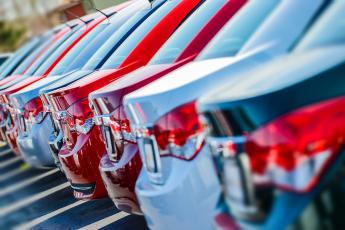
A growing world is going to require more energy and a diverse slate of fuels to power growing transportation demands. AFPM supports efforts to reduce the carbon intensity of transportation through technology-neutral policies capable of meeting consumer needs while protecting U.S. energy and national security. Unfortunately, the Biden administration, in partnership with California, is overseeing a whole-of-government campaign to ban most new gas, diesel and flex fuel vehicles in the United States. This agenda—spearheaded largely by the Environmental Protection Agency (EPA)— is bad for Americans, bad for our economy and threatens our national security.
EPA does not have congressional authority to regulate internal combustion engine vehicles out of the U.S. market, but the agency’s policies are charging toward that very end. And, sadly, the American people know little to nothing about it, even though their opposition to gas car bans and electric vehicle mandates is clear.
The big 3 government policies designed to limit access to gas cars
The federal government’s efforts can be summed up in three major policy proposals:
EPA’s light duty vehicle regulation
What the policy does: EPA’s regulation, finalized on March 20, sets tailpipe emissions standards for passenger vehicles that are so stringent automakers will have to rely primarily on battery electric vehicles and plug-in hybrids to meet them. Not one of today’s gasoline, diesel or traditional hybrid vehicles would meet EPA’s standard for 2032 on their own, and only about five of today’s plug-in hybrids would make the cut. EPA’s passenger vehicle rule will take effect very soon, starting with model year 2027 vehicles. The rule ends with model year 2032, at which point EPA’s own compliance scenarios show new gas cars and trucks are likely to be limited to less than 30% of overall new vehicle sales, down from more than 80% of sales today. The Agency’s proposals for later years will likely continue the trend until gas cars and trucks are eliminated from the market.
Why AFPM is concerned: EPA’s final regulation ignores every category of emissions, other than those from the vehicle tailpipe. That means there is no consideration of emissions associated with making, operating, and recycling vehicles and their batteries, or accounting for the benefits provided by liquid transportation fuels. The EPA standards treat a giant electric SUV with a several-thousand-pound battery—even if it’s charged on a coal-fired grid—more favorably than a small hybrid or an advanced internal combustion engine running on lower carbon intensity liquid fuels.
In addition to the imbalance in evaluating environmental performance, these EPA’s standards would trade American energy security, made possible by American-made, American-grown fuels, for much greater dependence on a battery and mineral supply chain dominated by China.
This policy will have very real consequences that cannot be undone even if there’s buyers’ remorse down the line:
- Under the final rule, consumers will not be able to access new gas, diesel or flex fuel vehicles in coming years the way they can today.
- Automakers will have to reduce the availability of internal combustion engine vehicles and continue inflating their costs to cover their losses on EVs.
- Should refineries close and EPA’s policy ends up being unworkable—either because consumers don’t want to buy an EV, the grid isn’t prepared or China cuts off supplies of critical minerals—a permanent loss of refineries and refinery jobs would sacrifice our country’s ability to produce essential liquid fuels for consumers, along with our energy and economic security.
Additional reading:
- AFPM: What to know about EPA’s passenger vehicle standards
- AFPM: Biden administration starts the ‘shot clock’ to finalize EPA’s de facto gas car ban (January 19, 2024)
- Wall Street Journal: Congress Takes on the EV Mandate (December 4, 2023)
- AFPM: What they’re saying: Call EPA's GHG proposal what it is… a de facto ban on ICE vehicles (July 12, 2023)
- AFPM: Three things to keep in mind re. EPA’s effort to ban new gas and diesel vehicles (July 12, 2023)
- Wall Street Journal: Biden’s EPA Remakes the Auto Industry (April 12, 2023)
- Wall Street Journal: The EV Mandate’s Fine Print (April 17, 2023)
DOT’s CAFE Standards
What the policy does: The Corporate Average Fuel Economy (CAFE) standards finalized in June by the National Highway Transportation Safety Administration under the federal Department of Transportation (DOT) also promote electrification of the U.S. vehicle fleet. DOT’s final CAFE standards establish 50.4 miles per gallon as the average fuel economy new U.S. cars and trucks must achieve by model year 2031.
The final standard reflects DOT’s assumption that, due to EPA and California regulations (see above and below), EVs and plug-in hybrids—which receive inflated credit in the CAFE miles-per-gallon (MPG) calculation—are going to make up a growing share of the vehicle fleet. Setting miles-per-gallon standards that depend on EV and PHEV adoption goes against Congress’s direction that EVs and their MPG scores should not be included in the calculation when setting fuel economy targets. Congress instructed DOT to ensure CAFE standards are ambitious but “feasible” for internal combustion engine vehicles. EVs are supposed to be a compliance flexibility, meaning their sales can factor into automakers’ CAFE compliance strategies, but the DOT standards cannot be set at levels that require EV adoption.
Additional reading:
- Wall Street Journal: Shocking Candor on Fuel Standards (August 23, 2023)
- AFPM: Opposition to gas car bans strong among the states (January 18, 2024)
- AFPM: AFPM statement on NHTSA’s CAFE and fuel efficiency standards (September 28, 2023)
EPA’s pending approval of California’s vehicle bans
What the policy does: The State of California in 2022 finalized regulations (Advanced Clean Cars II or ACC II) that would fully ban sales of new gasoline, diesel, flex fuel and traditional hybrid vehicles by 2035. California’s new ban would begin phasing in with model year 2026 vehicles and become more aggressive every year until 100% of new car sales in California meet the state’s definition of a “zero emission vehicle.” The one barrier to California’s plan is the federal government. California has to get federal authorization from the EPA, in the form of a Clean Air Act waiver, to enact its ban.
If EPA grants California a waiver, millions of Americans—including millions outside California—will lose the option to buy the car or truck THEY want. That’s because roughly a dozen states, covering close to 35% of the U.S. population, have already adopted or signaled their intention to adopt California’s ban as their own. These decisions are often being made behind closed doors via state agencies and gubernatorial directives rather than publicly through state legislatures or popular votes.
It is up to the Biden administration whether one “super state,” California, gets to ban sales of new gas cars for much of the country and whether California’s policies will be allowed to continue threatening jobs in places like Michigan and Ohio, states that have intentionally never embraced California’s vehicle extremism.
Additional reading:
- Wall Street Journal: If You Like Your Jeep…(May 29, 2023)
- Wall Street Journal: The Real Electric-Vehicle ‘Choice’ (August 25, 2023)
- AFPM: EPA should reject California’s request to ban gas vehicle sales outright (January 10, 2024)
- AFPM: President Biden is the ultimate decider on California’s push to ban gasoline and diesel vehicles (May 24, 2023)
- AFPM: **Updated**CA Seeks EPA Authorization to Ban Gas and Diesel Vehicle Sales. Policy Could Spread to Other States Too. (March 6, 2023)
- AFPM: California Ban on Gas & Diesel Cars and Trucks Should Concern Every American (August 25, 2022)
There’s a better way than banning gas cars
AFPM believes we have to work together to reduce the carbon intensity of transportation and improve vehicle performance and efficiency for consumers. Our members are doing that work. And unlike the Biden administration’s big three proposals, we believe successful, consumer-first policies must encourage real competition among all vehicle technologies and powertrains, including American-made, American-grown fuels. We can reduce emissions faster, more affordably and without trading away our energy security if our federal policies allow liquid-fuel-powered vehicles and hybrids to compete alongside electric vehicles in a lower-carbon-intensity transportation fleet.



